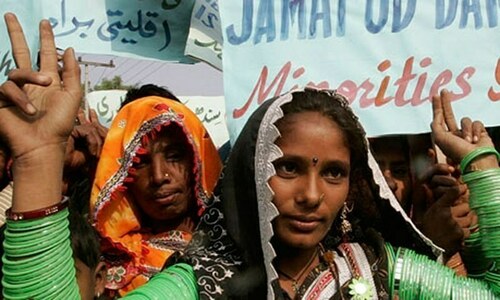PAKISTAN’S social and moral trajectory is alarming. The rejection of a bill aimed at stemming forced religious conversions by a parliamentary committee convened to address the issue is the latest in a line of dismaying developments highlighting Pakistan’s deepening schisms and intolerance.
There are mumbles about why the bill was rejected: the proposed age limit on conversions; and the call for a 90-day cool-off period to consider the decision before proceeding. But the real reason is that the current social, religious and political environment in the country has become so oppressive that a meaningful act of inclusion is deemed inconceivable.
The religious affairs minister reportedly said that the ‘environment is unfavourable’ for such a law, and implied it would generate resentment that would make minorities more vulnerable. The law minister also cautioned that the legislation would be ‘dangerous’, implying violent retaliation.
This is a good example of the ‘Talibanisation’ of Pakistan of which we were forewarned over the past decade. The fact that government representatives are resigned to a status quo in which minority rights are not worthy of upholding should be problematic for everyone.
An act of inclusion is deemed inconceivable.
A key problem is that the term ‘forced conversion’ glosses over what’s really at stake. Reportedly, some 1,000 girls from religious minorities, primarily Hindus, are forced to convert each year. These conversions can involve abduction, rape, violence, human trafficking and extortion. They also enrich clerics who receive payments for solemnising such marriages, corrupt police officials who take bribes instead of investigating, and magistrates who look the other way. By rejecting the bill, our lawmakers are condoning these other activities. How does this serve Islam?
There is already a law prohibiting forced marriage, and making the marriage of minors and non-Muslim women punishable with imprisonment. But it remains unenforced, which is why a bespoke bill on forced conversions was proposed.
Sadly, religious minorities’ desperation to protect their own is not being heeded. Many religious and political stakeholders deny that forced marriages occur. Or they wave off the issue as a quirk of three districts in Sindh, and not worth of being addressed through national legislation. Similar bills have been rejected in 2016 and 2019. Disdain for minorities has also been entrenched in the current process. The religious affairs ministry apparently did not consult minority representatives while reviewing the bill, while the Council of Islamic Ideology invited the cleric accused of enacting forced conversions in Sindh for a briefing.
Most readers from the religious mainstream will gloss over these words, thinking they have little direct relevance. But the way a state treats its minorities is ultimately reflective of how it will treat all its citizens. All Pakistanis should be concerned by the callousness.
Read more: Minorities’ rights, places of worship to be protected: CJP
Minority rights ensure respect for distinct identities, whether along religious, ethnic, linguistic, gender or any other lines. The goal is to ensure that difference is tolerated and protected. Where minority protections work well, groups can engage and collaborate with each other no matter what distinguishes them. Managing religious pluralism, or any other minority identity, creates the right social and judicial environment, governance and frameworks to ensure that all differences can be negotiated, leading to more social resilience.
Minority inclusion also ensures that marginalised groups do not react to majority pressure by ramping up efforts to preserve and protect their identity in a way that breeds passionate defence and potentially fuels armed conflict. In Pakistan, this trend has been apparent among non-dominant Muslim sects but is even more relevant in the context of ethnolinguistic identity. The state’s weak response to inclusion since its inception has set the stage for constant hostile confrontation.
The failure to pass this bill also undermines the writ of the state and highlights its inability to guarantee citizens’ protection and freedom. Non-Muslim religious minorities are vulnerable enough that their maltreatment does not produce destabilising results. But their predicament shapes how other minorities view the state and their expectations of lawmakers, with more serious consequences.
Read more: Minorities equal citizens of Pakistan, state's job to protect them: PM Imran
In democracies, majority rule is constrained in order to protect minority rights — all minority rights. Ultimately, the goal is to make sure the majority cannot oppress those with dissenting or contrarian views. When unchecked and uncompelled to accommodate minority or marginal positions, the majority becomes authoritarian in a way that erodes everyone’s rights. Religious minorities are already struggling to keep their loved ones safe, and to preserve the dignity and sanctity of their faith. Do you want to be in the same position some day?
The writer is a political and integrity risk analyst.
Twitter:****@humayusuf
Published in Dawn, October 18th, 2021













































